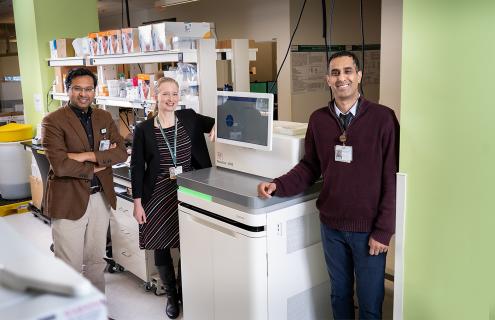
Whole exome sequencing when applied in a clinical setting is a game changer for our entire health system.
Gregory J. Tsongalis, PhDWith an eye on better precision medicine, researchers in The Dartmouth Health Center for Clinical Genomics and Advanced Technology (CGAT), located in the Department of Pathology and Laboratory Medicine, have scaled up efforts to look for genetic variants (mutations) in patients with a variety of disorders, including cancer.
Until now, molecular profiling efforts for both cancer and inherited diseases only looked at the most commonly altered genes known to impact the diagnosis of disease and a patient’s response to therapy. “Whole exome sequencing” allows the laboratory to sequence all 20,000+ genes to get a complete look at a patient’s entire genetic code and allow oncologists to pinpoint better therapeutic strategies. However, this type of sequencing generates terabytes and petabytes of data—or to put it in perspective, more data than several health systems in their entirety. The challenge then becomes finding a way to analyze such enormous datasets.
Parth S. Shah, MD, Director of Genomic Informatics, and his team have developed computer algorithms to do just that. “We have implemented a unique system that combines lab testing and data analysis in a timely fashion that will have a direct impact on patient care,” says Shah.
Having a comprehensive molecular profile allows providers to select the most appropriate and best targeted therapy for their patients. “The data we get from whole exome sequencing will significantly advance our capabilities in precision medicine, including the identification of extremely rare genetic changes, which are not detectable by routine testing,” says Laura J. Tafe, MD, Assistant Director of CGAT and lead investigator on the somatic cancer testing whole exome sequencing project.
Tafe also directs the Dartmouth Cancer Center’s Molecular Tumor Board, “A goal of which is to identify patients who may be eligible for clinical trials based on cancer sequencing data,” she says. “With whole exome sequencing we’ll be able to find more patients eligible for precision-based treatment options.”
While a major focus of the CGAT whole exome sequencing effort has been focused on cancer, the new test is also being applied to the detection of variants associated with hereditary disease conditions. “The ability to look across the entire genome instead of just at a few genes, makes the diagnosis of complex hereditary diseases more feasible,” says Wahab A. Khan, PhD, Assistant Director of CGAT and lead investigator for the germline whole exome sequencing project. “We will play an unprecedented role in defining and detecting rare hereditary disease conditions seen in our rural population,” says Khan.
Patients and their families are the ones to benefit most from this new testing. In addition, the massive amounts of data generated will allow researchers at Dartmouth Health and worldwide to probe the underlying mechanisms of disease in an attempt to develop better diagnostic testing and therapeutics.
At Dartmouth Health, patients can expect the most state-of-the-art testing that is leading the way in precision medicine. “Whole exome sequencing when applied in a clinical setting is a game changer for our entire health system,” says Gregory J. Tsongalis, PhD, Director of CGAT. “To the best of our knowledge, Dartmouth Cancer Center is the only cancer center in the country routinely doing clinical whole exome sequencing on solid tumors. Other centers are doing this on a research basis only. Sequencing is being run on specific tumor types at the moment, with the future goal of running it on all cancer patients." Tsongalis also notes that some insurance companies cover the service while others do not, but this is slowly changing.
Through CGAT, Dartmouth Cancer Center is now able to provide locally the most advanced, cutting-edge testing which is currently available in only a handful of institutions in the world. Testing makes sure patients have the best possible chance of being matched to the most appropriately tailored treatment strategy for them.